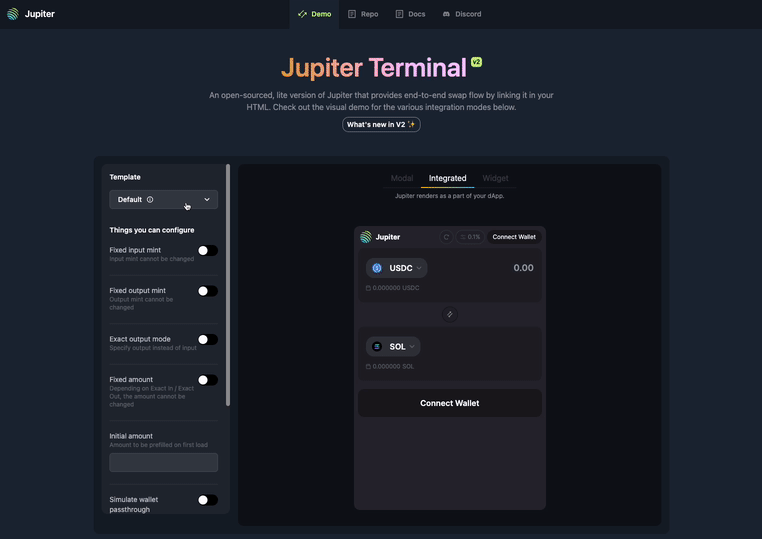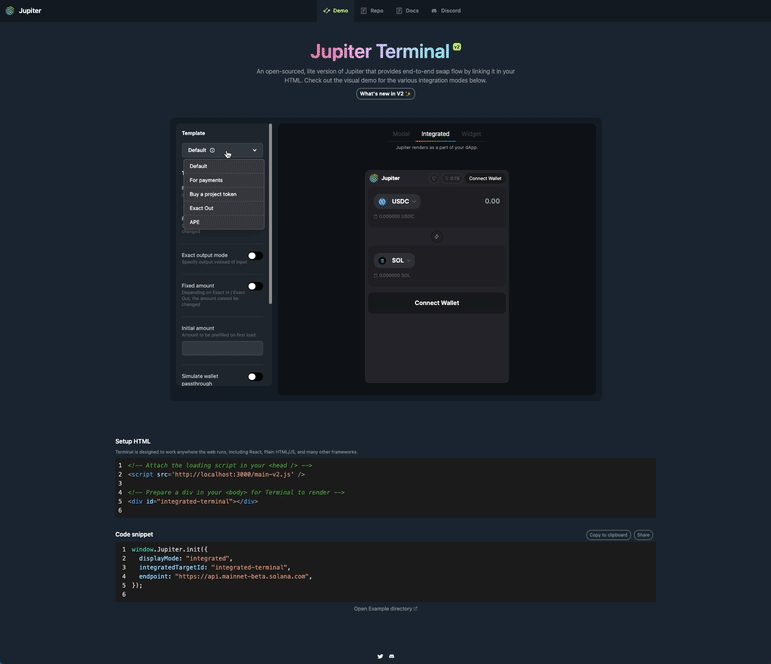Jupiter Terminal Docs

Jupiter Terminal is an open-sourced, lite version of Jupiter. This terminal provides end-to-end swap flow functionality by linking it in your HTML with just a few lines of code. Terminal runs on the v3 swap protocol supporting Instant Routing, Smart Token Filtering, Ecosystem Token List support.
Provided with the code are several templates to get you started and auto generated code snippets.
- Demo: https://terminal.jup.ag/
- Repo: https://github.com/jup-ag/terminal
- Detailed implementation guide: Get a step-by-step walkthrough
Core Features
main-v2.jsbundle (~73.6Kb gzipped)- app bundle (~952Kb gzipped) are loaded on-demand when
init()is called - alternatively, preload app bundle with
data-preloadattributes
- app bundle (~952Kb gzipped) are loaded on-demand when
Agnostic
- Work with any dApp,
Integratedor as a standaloneWidget, orModal - Any framework, React, Plain HTML, and other frameworks.
- Responsive on any screen size
- Work with any dApp,
Form customisation
- From Full swap experience, Payment Flow, to Ape-ing tokens
- Fixed input/output amount, or mint
- ExactIn, and ExactOut (e.g. Payment) swap mode
Built-in Wallets
- Wallet Standard
- Passthrough Wallet from your dApp
- Powered by Unified Wallet Kit
Lite, but powerful
- Jupiter v6 API with Metis (New✨)
- State sharing with syncProps() (New✨)
- Price API integration, with high decimal/precision support to trade meme tokens
- ExactOut (e.g Payment)
Fees Support
- Customisable fees
- Track fees with Jupiter Referral Dashboard
Getting Started
1. Setup HTML
Terminal is designed to work anywhere the web runs, including React, Plain HTML/JS, and many other frameworks.
<!-- Attach the loading script in your <head /> -->
<script src="https://terminal.jup.ag/main-v2.js" />
<!-- Optionally, preload for better experience, or integrated mode -->
<script src="https://terminal.jup.ag/main-v2.js" data-preload />
2. Initialize Jupiter Terminal
Scenario 1: Terminal as part of your dApp (Passthrough Wallet)
Your dApp already has a <WalletProvider />.
window.Jupiter.init({ enableWalletPassthrough: true });
Then, syncronise wallet state between your dApp and Jupiter Terminal with syncProps()
import { useWallet } from '@solana/wallet-adapter-react'; // Or @jup-ag/wallet-adapter;
const passthroughWalletContextState = useWallet();
useEffect(() => {
if (!window.Jupiter.syncProps) return;
window.Jupiter.syncProps({ passthroughWalletContextState });
}, [passthroughWalletContextState.connected, props]);
Scenario 2: Standalone Terminal
Your dApp does not have a <WalletProvider />, or is a plain HTML/JS website.
window.Jupiter.init({});
3. Setup other props
window.Jupiter.init({
/** Required
* Solana RPC endpoint
* We do not recommend using the public RPC endpoint for production dApp, you will get severely rate-limited
*/
endpoint: 'https://api.mainnet-beta.solana.com',
// ...other props
});
4. Finishing touches
Terminals are light but full of features, such as customizing form behavior, fees, styling, and much more.
Go to our Demo to explore all these features, with automagically generated integration code.
Or, check out our fully typed API reference for more details.

Additional API Reference
Typescript Support
Since Jupiter Terminal is only importable via CDN, to get proper typing, you can create a typing declaration jupiter-terminal.d.ts file in your project, and copy the contents in src/types/index.d.ts
declare global {
interface Window {
Jupiter: JupiterTerminal;
}
}
// ...
// ...
// ...
Fee Support
Similar to Jupiter, Jupiter Terminal supports fee for integrators.
There are no protocol fees on Jupiter, but integrators can introduce a platform fee on swaps. The platform fee is provided in basis points, e.g. 20 bps for 0.2% of the token output.
Refer to Adding your own fees docs for more details.
Note: You will need to create the Token fee accounts to collect the platform fee.
import { getPlatformFeeAccounts } from '@jup-ag/react-hook';
// Jupiter Core provides a helper function that returns all your feeAccounts
const platformFeeAndAccounts = {
feeBps: 50,
feeAccounts: await getPlatformFeeAccounts(
connection,
new PublicKey('BUX7s2ef2htTGb2KKoPHWkmzxPj4nTWMWRgs5CSbQxf9'), // The platform fee account owner
), // map of mint to token account pubkey
};
window.Jupiter.init({
// ...
platformFeeAndAccounts,
});
Resuming / Closing Activity
Everytime
init()is called, it will create a new activity.If you want to resume the previous activity, you can use
resume().close()function only hide the widget.
if (window.Jupiter._instance) {
window.Jupiter.resume();
}
window.Jupiter.close();
Strict Token List
strictTokenList?: boolean;- Default:
true
The Jupiter Token List API is an open, collaborative, and dynamic token list to make trading on Solana more transparent and safer for users and developers. It is true by default to ensure that only validated tokens are shown.
Learn more at: https://station.jup.ag/docs/token-list/token-list-api
Default Explorer
defaultExplorer?: 'Solana Explorer' | 'Solscan' | 'Solana Beach' | 'SolanaFM';- Default:
Solana Explorer
The default explorer is set to Solana Explorer;
You can change the default explorer by passing in the explorer name to the defaultExplorer prop.
onSuccess/onSwapError callback
onSuccess() reference can be provided, and will be called when swap is successful.
While onSwapError() will be called when an error has occurred.
window.Jupiter.init({
onSuccess: ({ txid, swapResult }) => {
console.log({ txid, swapResult });
},
onSwapError: ({ error }) => {
console.log('onSwapError', error);
},
});
Customising styles: CSSProperties
Any CSS-in-JS can be injected to the outer-most container via containerStyles API.
Examples:
- Custom zIndex
window.Jupiter.init({
// ...
containerStyles: { zIndex: 100 },
});
- Custom height
window.Jupiter.init({
// ...
containerStyles: { maxHeight: '90vh' },
});
Customising className: Tailwind className
Tailwind classes can be injected to the outer-most container via containerClassName API.
Example:
- Custom breakpoints
window.Jupiter.init({
// ...
containerClassName: 'max-h-[90vh] lg:max-h-[600px]',
});
Upcoming feature / Experimentation
- Limit Order
- DCA
- Experiment separate bundle for passthroughWallet